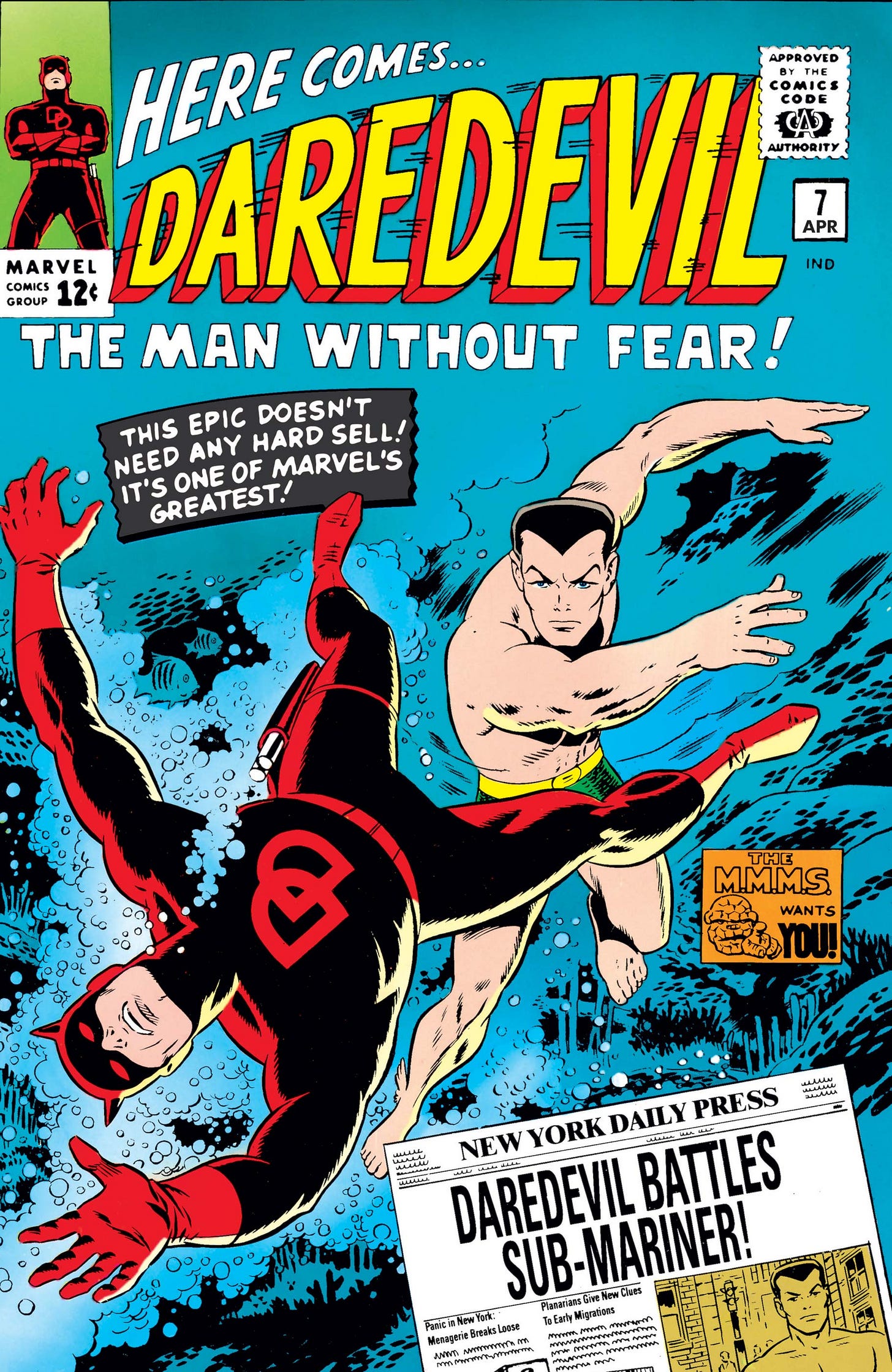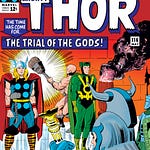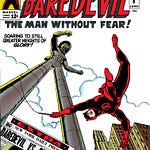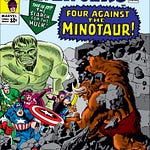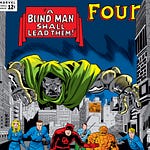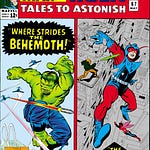In this episode:
Mike and Ed discuss the trial of the century! Namor the Submariner is on trial for vandalism, which seems like a minor charge for the head of state of an empire that attempted to take over the world. He is represented by celebrity lawyer Matthew Murdock. Murdock, who also represents the Fantastic Four in real estate matters and is accordingly well familiar with super-powered individuals and their super-powered issues. But regardless of client base, can one lawyer really understand civil AND criminal law? Is Murdock too specialized … or not specialized enough?
Behind the issue:
Namor continues to be one of the only “anti-heroes” in Marvel Comics at the time. He is self-righteous and impatient, but he is also honorable and motivated by more than taking over the world and being “evil”. Stan Lee clearly liked writing this character, and he will soon get his own monthly feature.
In this issue:
Namor, as leader of Atlantis, wants to find a peaceful way to take over the surface world. He visits Matt Murdock and tells him he wants to sue the human race Murdock says that’s impossible, and Namor leaves in a huff. He then causes a ruckus in New York City, causing wanton property damage, leading to his arrest after battling Daredevil (who is secretly Matt Murdock) in the streets. Murdock then represents Namor on the criminal charges brought against him, and countercharges the human race (which is quickly, and correctly, thrown out of court). Namor is then informed of a rebellion back home, which causes him to just leave the jail and attempt to return home. Daredevil battles Namor again, and does quite well, but ultimately Namor wins the battle and returns to his life below the waves.
Assumed before the next episode:
Matt Murdock rethinks his approach to the practice of law after this disastrous experience.
This episode takes place:
After Namor returns to the sea.
Full transcript:
Edward: Mike, does this mean that we're defendants? Are we defendants because we're part of the human race? ?
Micheal: Short answer, no. , no. But it's a surprising turn of events in,
Edward: is it though, is it surprising? Is it actually surprising?
Micheal: I guess we should, we should never use the word surprising when it comes to superheroes and New York City. But, the recent news. Not surprising, but unfortunate from a lawyer's perspective about the abuse of the legal system and the justice system. I would say,
Edward: Mike, you can handle it when they tear apart our cities, but when they tear apart our legal system, that's when you get upset.
Micheal: That's a long too far. Ed. That's just a, just, it's too much. It's outrageous. It's outrageous. I'll say that,
Edward: So, hey, what I'm talking about here is that, Namo, the Submariner, the Prince of Atlantis, was charged with what, with vandalism. He's going to jail for vandalism, ,
Micheal: pretty penny anti stuff, like causing a ruckus in the city and causing damage. And then he hires a pretty wellknown lawyer. A lawyer we've talked about before, Matt Murd.
Edward: Yeah. Matt Murdoch. So he represents the Fantastic four. He also had some notoriety in the past. He came forward and said that made this big claim that he could prove that Daredevil and the Matador were the same person and it turned out that that was not true. , that Daredevil is not the Matador. And, he got a little bit of egg on his face for that one, but now he's back, he's back in the public eye. Probably the most famous lawyer in the world, right. .
Micheal: Yeah. So, I've always found it confusing when I've read about Mad Murdoch, cuz I thought he was mainly a criminal lawyer. So it's odd that he would be on retainer or have anything to do with a Fantastic Four. But here at least he, it started out as being a criminal matter like NAR was charged with an offense and had to appear in criminal court. But what was confusing? Which causes me to question Matt Murdoch. As a lawyer is that he filed a counter charge. You're gonna see entire human race. No, no. Like what's, that's, that's, that's ridiculous. Like, like
Edward: so, so Mike, in your legal opinion, he can't do that.
Micheal: Yes, yes. That's my legal opinion. Like there's, there's just no way to describe it other than the criminal court involves, there's prosecutions in the simplest way, the state lays a charge against a person for an offense and that's what happens. Like the person who's been charged with the offense doesn't get to claim against this. The state , if you like, we have a whole system, we have civil litigation for that purpose. If you want to say as an individual, Sue, the United States. You can advance a claim, I guess if you're the basis for it, or Sue you, or anybody.
But you don't,
Edward: could you, could you Sue the, is the human race one of the options? Can you Sue the entire, no, not a person. But what, but what if the human race has done me wrong? What if the human race has, I don't know, killed my dog, can't I? Can I file a claim against the human race for doing that?
Micheal: No. No, ed, I'm just telling you I'm gonna entertain this. Other than like, you just can't. You can't. If you've got a problem with the human race, I guess, you know, then you should. Talk to like a therapist or something. But if you have a claim for damages that you want to advance in civil court, it would be against entities such as United States. It could be the state of New York. It could be, any number of companies. It could be any number of people. But this concept of the human race, uh, isn't, uh, a, a viable party.
Edward: How small a group do you have to go to? Like the Native Americans were treated very badly by the European settlers when they came to America. If there is a leader of the Native American tribes, can they counter Sue against the American people, the American government? Is that possible?
Micheal: I don't wanna get into that, that's a whole conversation about indigenous rights but you're talking about a group of people who have been mistreated in the past. It's not like you could just Sue a group of people you need a definable defendant. You can't counterclaim against the human race when you've been charged criminally and that's what Matt Murdoch did. And the question is why would he do that? Because he's obviously not a moron, but that's a moronic thing to do, like and it,
Edward: it's, you're not stupid, sir. But that was a stupid question, .
Micheal: That's right. And it's so why would he do it? He's not an idiot, so he knows that he shouldn't do this, and the only person that benefits from what he did is himself. For the notoriety, because we're talking about it right now. Naor doesn't benefit from it because he's, first of all, he's paying Matt Murdoch for this service, and it's a service that he can't really discharge, which is. To represent him properly in a criminal dispute where he advances a claim that they'll be dismissed right away.
Edward: Unless Namir is just doing it for publicity as well. Sure. Matt Murdoch's getting a ton of publicity from this, but so is Namir. I think everyone is talking about the fact that he believes that. Humanity owes him something. And I think that talk has happened. Clearly the judge shot it down. There's no counterclaim happening, but, we're still talking about it. Maybe that's what he wanted.
Micheal: As it relates to Murdoch. I think that he acted contrary to the duty that he owes as a lawyer, because you're an officer of the court and you can't knowingly advance something that's fundamentally inconsistent with the justice system. There is a time and a place to advance a claim, a personal claim. It's not a criminal court. And Murdoch knows that such a complete waste of time and a complete waste of judicial resources. And he shouldn't have done
Edward: but, but Mike, yeah. But it was one sentence he said in his corner or that was shot down immediately? No, no, no. As far as time wasted, like there was not that much time was.
Micheal: No, no. Ed, I know that he says he, he wanted to file that, but he had to actually file written papers. The other side being the state would've to respond to it, to dismiss it and, advance an argument. But what I'm saying is that Murdoch, if he truly wanted to discharge his duty, and he would've the same notoriety to be honest. If he could have, assisted na more as a head of states, I suppose, to navigate diplomatic world, to advance grievances, I guess between one state and the United States and perhaps advance that the United Nations or. Consider how to advance a civil claim for damages with respect to say, I don't know, the ocean or something and how the United States is interfering with their homeland. There's things that can happen countries have disputes through different processes and treaties throughout the world or on the world. You could advance these claims, but to do it in this, it's abusive of the system of justice and it's also just counterproductive and it didn't really serve what apparently name or aims are. And I think as a lawyer you have to do your best to serve the interests of your client, even if it's telling them, great idea. We can't do that. , and here's why.
Edward: Well, this is why that you're not his lawyer. Mike, if you, if he came to you , you'd be like, no, go, swim in an ocean Naor. But Murdoch was like, Hey, I'll take you for your word and we'll go and we'll actually do it. Even though to your point, it was a bad decision to do. But what of the things you touched on there, I think he's worth exploring is Nair's, a head of state. Are we allowed to charge the head of state with vandalism when they visit our country? Is that a.
Micheal: I, have limited understanding of that, but the way I understand it's that if a head of state is here on official business, I think that they have some kind of protection against prosecution, right? Because otherwise there could be some mise, I suppose, about visiting heads of state in foreign lands with different laws to what?
Edward: Yeah, like it was, it was only otherwise applied to them. It was only last year when craven, this international hunter came to New York. Craven is not the head of state, he's just a foreign national. He came into our country and then proceeded to hunt a human being, and, we didn't charge him, we just, deported him. So why was he deported? Whereas Namo. While he did many bad things, didn't hunt a human, and, uh, say what you will about namir.
Micheal: Say what? You'll about namir. He didn't hunt a human. He didn't hunt a human one bit. Not at all. .
Edward: Yeah. He just be broke down. Some, some walls and stuff caused some damage. Why does that go to court at all? Why is it happening? Does the US even have the ability to do that? Are we allowed to? Well, clearly we are. Cause we did. But is that a.
Micheal: Yet another failing of Matt Murdoch. I mean, you
Edward: shoulda dismissed. You shoulda had dismissed
Micheal: right off the bat. Yeah. I have a feeling, I have a feeling that Mr. Murdoch may run up against, a complaint at the bar, if not by name, more than perhaps by other participants in the justice system for just this complete dereliction of duty. I would say as a lawyer, just outrageous, but ultimately, maybe he doesn't care that he keeps his license. He's like, so, He has, like everyone knows who he is. He can say he's got the Fantastic Four and now name, where as his clients. And there might be, there's probably, an appeal to a lot of, clients to having a famous superhero adjacent. Lawyer and maybe Murdoch is trying to get away from the criminal work to get into the civil work or the commercial work to make more money.
Edward: I feel like we've been talking about this it's come up again and again where you keep having this idea that we need to have like specialty, specialty right people for the superhero space. Well, here, Matt Murdoch has done that and instead of specializing in insurance or criminal law or family law, Whatever else you lawyers do. He said, I'm gonna specialize in superhero law. And he's representing the Fantastic Four in I don't know, real estate contracts and he's representing Namo in criminal court. And he's like, I can do it all. As long as it's like, as long as it's superhero adjacent, I can cover across all the different legal verticals.
Micheal: Yeah, I think that, I thought, a bit more of a narrow specialty ed, like, I act for insurance companies, but it's not like Civil and commercial disputes. But it's not if, say that one of the executives was charged with murder, they would hire me to do the murder trial. Like it's just like that's a specialty, that's a unique set of, are you saying specialized area?
Edward: You are a specialist in insurance murders.
Micheal: No, . They need a murderer lawyer. They don't need a, they need, they don't need like an insurance lawyer just cuz they work in that industry. So I think that, I think Murdoch is being, I would, I'd use the word irresponsible.
Edward: I would use the word opportun.
Micheal: and you do some other op opportunistic lists. Right? But I'd imagine that he could seek, I'm sure he could specialize in doing, superpower criminal work. And maybe he could have a law, join a law firm where there'd be other people that work in that as in that field, or they service the superhero community. But a specialist does the real estate work for superpowered people. A specialist does the damages claims for superpowered people.
Edward: I think the problem, Mike, is that the insurance industry is a much bigger industry than the superhero industry. Mm-hmm. , there's just, there's, there aren't like, I dunno how many people. Work in insurance in America, but I'll bet that number is much higher than the number of superheroes there are in America. And so it feels like they need more legal support. And so there may not be enough work out there for a lawyer that specializes in like superhero real estate or superhero insurance or superhero accounts management.
Micheal: No, no, I get it. I think though, I guess what I'm trying to work out here for Murdoch , his problem is that I think what I'm seeing is that you could still be the go-to person for when, as if you're a superhero who's charged with a criminal matter. You could be the go-to person because you to that community and. would lead to more regular business. Like when I started out, I did some work at a criminal law firm with a very famous and well-known, criminal lawyer. And I, didn't want to be a criminal lawyer after that experience, but I definitely saw the business model where this lawyer serviced like very high profile cases. He serviced that industry where people would go to him. Rich and famous people if they were charged with an offense. And he did that. He acted as her lawyer. But the bread and butter wasn't that work. The bread and butter was more the regular assaults and fistfights and whatever that criminal lawyers do. So, by extension, I think that someone like Murdoch could. Service the superpower community to bring in the rest of the work. Just like a commercial. He could do the same thing, you know?
Edward: Got it. So he goes and represents the superheroes in their fights and their battles, and their disputes becomes famous, and then spends his time representing normal criminals.
Micheal: That's right. And so that way, it drives in the business what I think the irresponsible part is that he's being too broad. I don't think that you can say you're a specialist for the superhero community, but I think you can see I'm a specialist in criminal law and I've acted for these, superheroes, that's just the marketing thing that he's.
Edward: Maybe, we should take our show and expand it to talk about non superhero stuff. We bring people in for the superheroes, , and then we just talk about normal everyday things that are not as interesting. But you, you already lo know and love us, so you stick around for the other stuff.
Micheal: Come for the heroes, stick around for the, um, stuff, other stuff.




